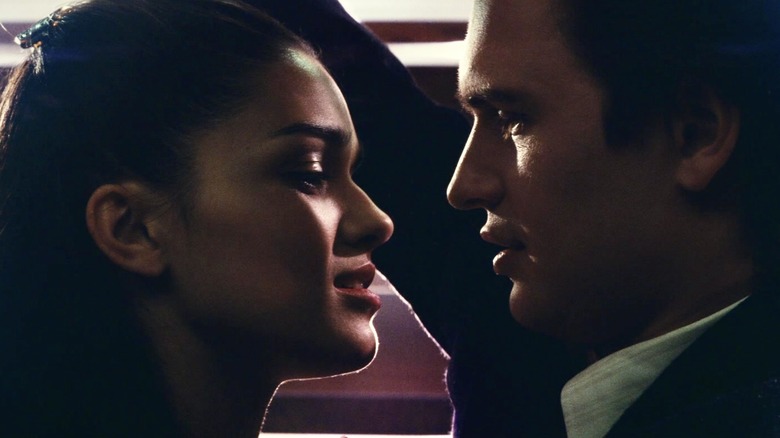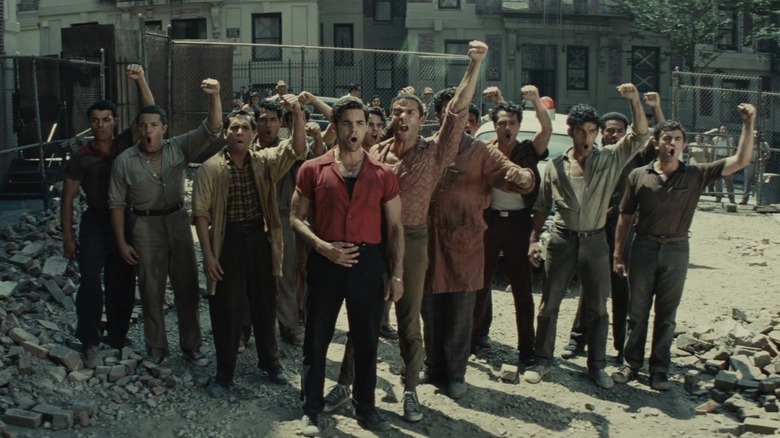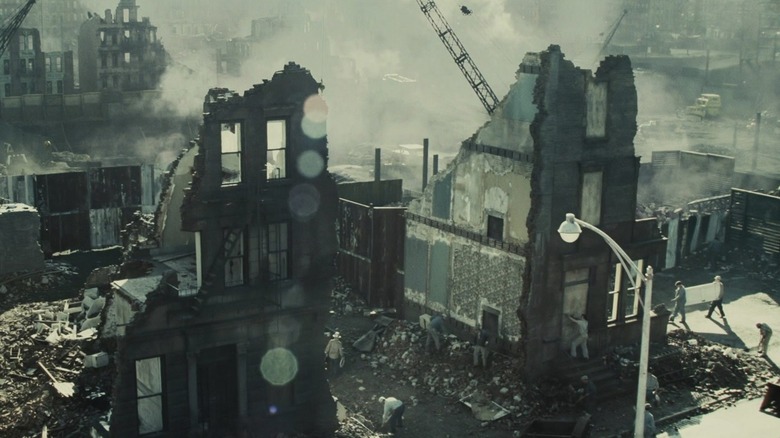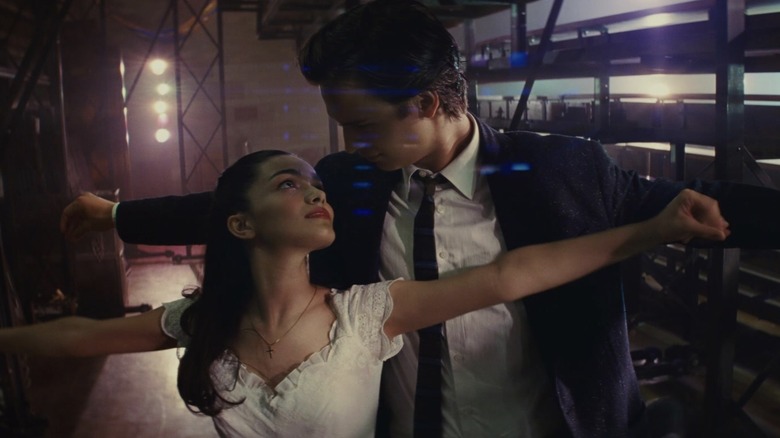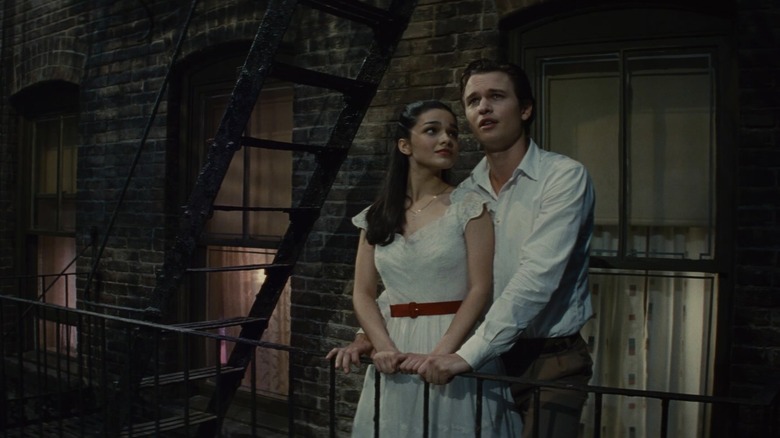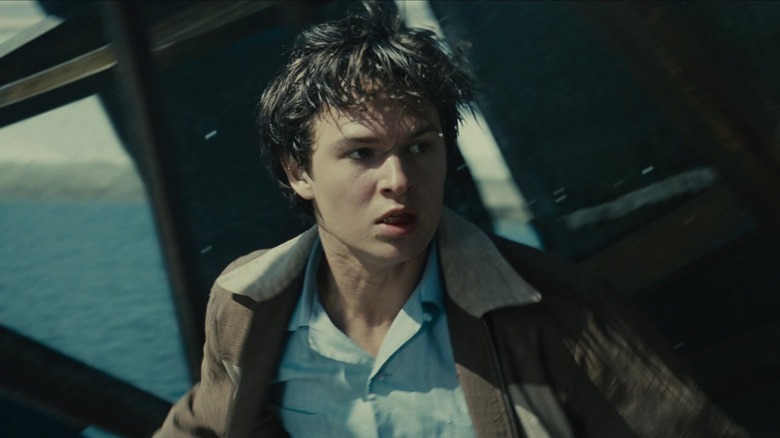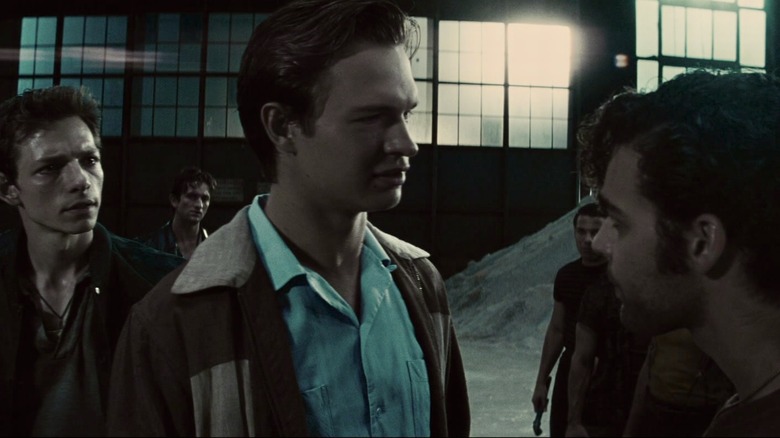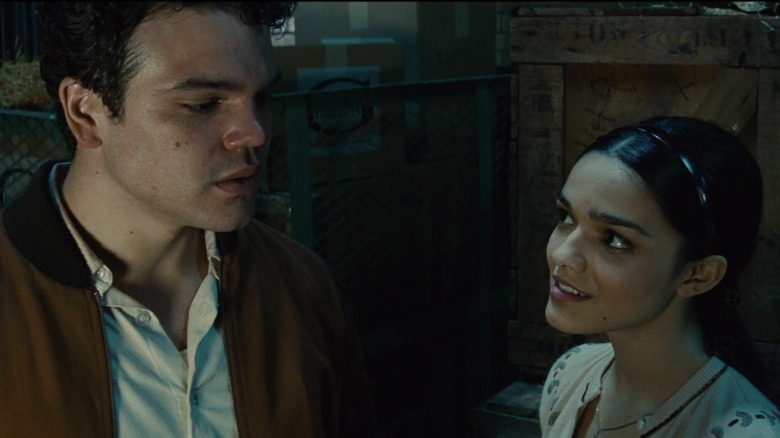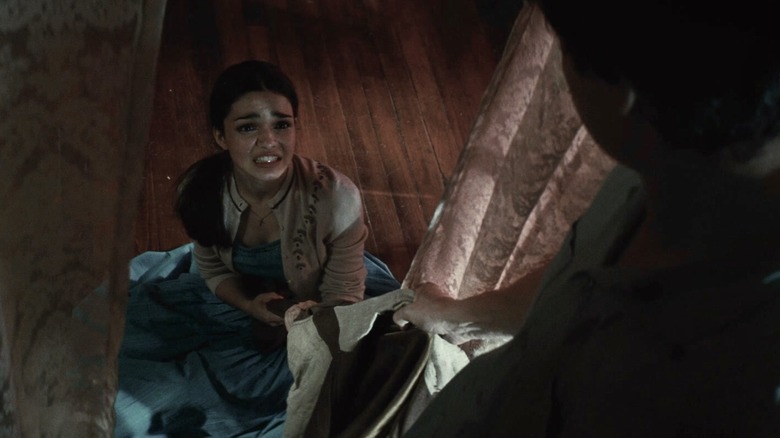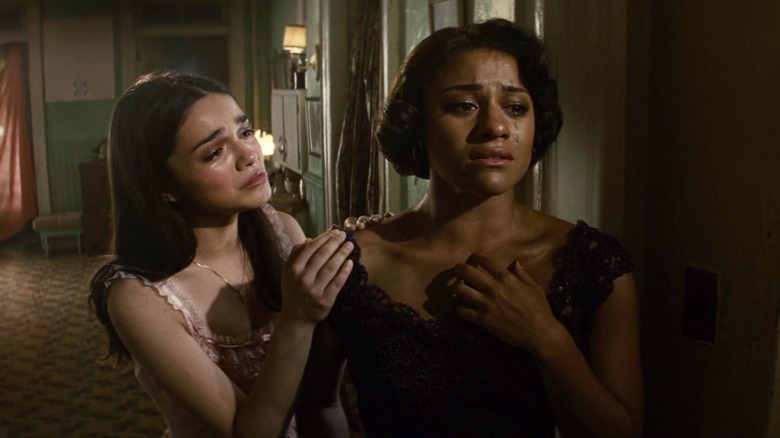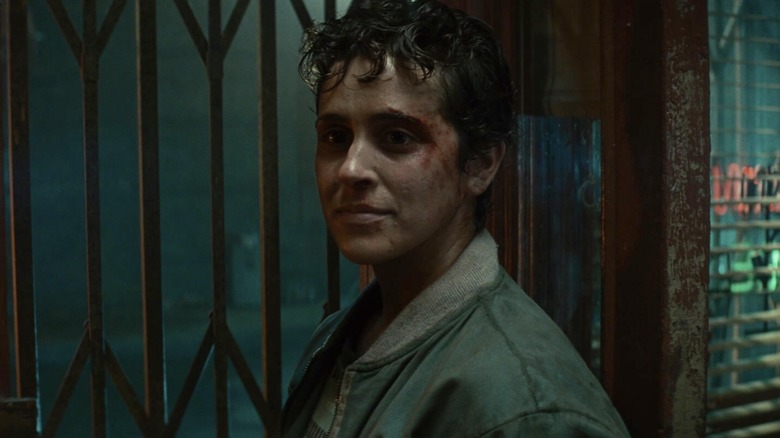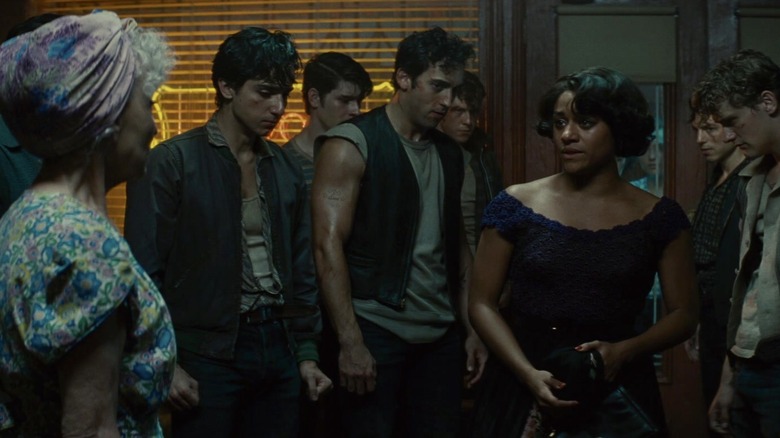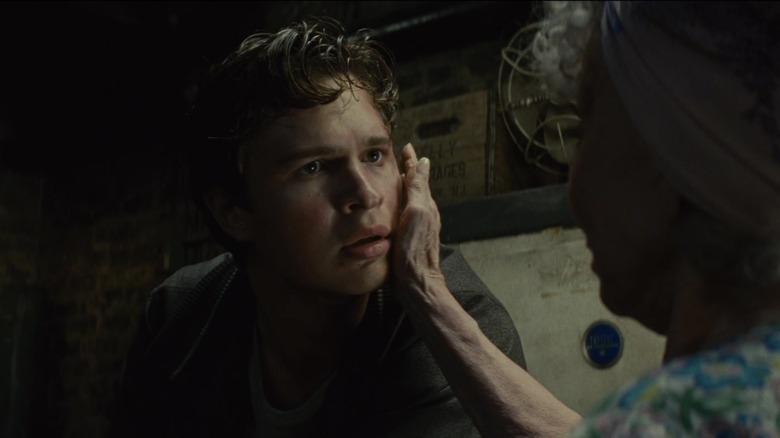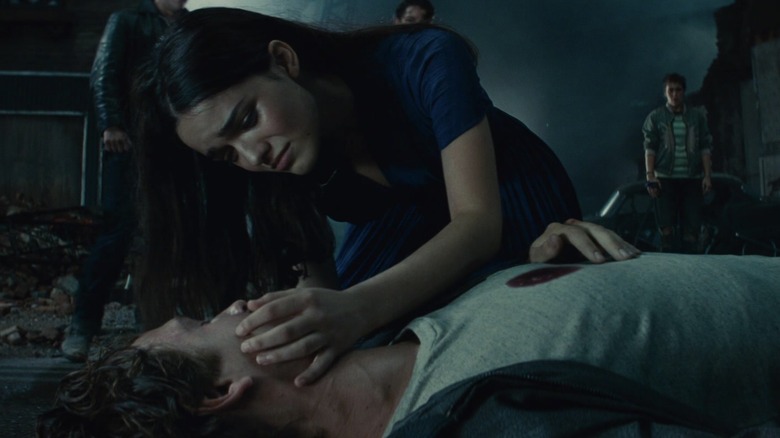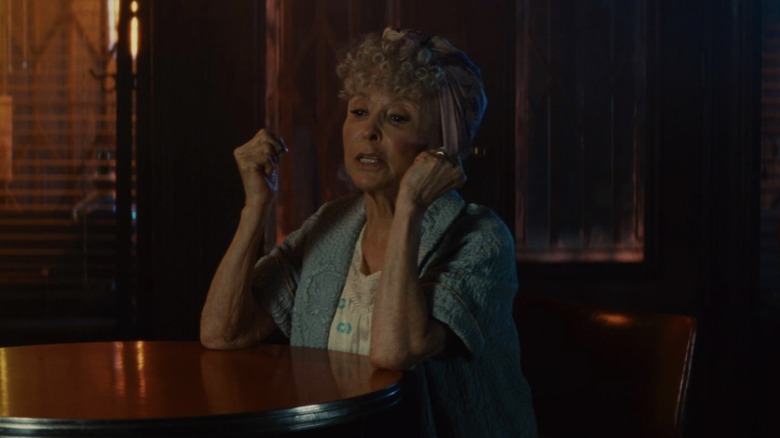The Ending Of West Side Story Fully Explained
Romeo and Juliet's timeless tale has been explored through numerous iterations, but when their tragic story was reimagined as a musical about gangs set amid a crumbling Manhattan neighborhood slated for urban renewal, the story became uniquely American. "West Side Story" frames the conflict tearing these star-crossed lovers apart as one between two rival gangs, the Jets and the Sharks, embroiled in a turf war.
Steven Spielberg's adaptation of the Tony-winning Broadway musical explores America's shameful legacy of racism, segregation, and gentrification for a new generation. Musicals aren't as popular as they once were (per IndieWire), and many were skeptical a remake of "West Side Story" would be successful with modern audiences (per Quartz). Even Tony Kushner, who wrote the screenplay, wasn't sure it was a good idea until Spielberg convinced him. The excellent scores on Rotten Tomatoes confirm the reboot was a hit with audiences and critics alike, though it was a theatrical flop (per Quartz).
In a promotional video for 20th Century Studios, Spielberg suggested recent evidence of reinvigorated racism and a growing political divide in the U.S. made this story just as prescient today as it was in 1957 when the musical first hit stages. Spielberg's film exceeds the original while reminding us, as Spielberg said, "Love bridges every divide." We suggest you grab a pack of tissues before you press play because the story of Maria (Rachel Zegler) and Tony's (Ansel Elgort) forbidden love grips the heart and will almost certainly make you cry.
The opening sequence of the film sets the stage for the conflict
The opening dance number of Steven Spielberg's 2021 "West Side Story" fully captures the conflict between the Jets and the Sharks. One gang, the Jets, represents the white inhabitants of their Manhattan slum, and the Sharks represent the growing number of Puerto Rican immigrants. The opening scene establishes the rivalry as one based on race, rather than two families with a long history of grievances as depicted in William Shakespeare's tragedy, "Romeo and Juliet," which the play is adapting.
The film begins as the Jets walk into the Puerto Rican district, harassing local merchants. The Jets carry paint cans stolen from the demolition site to deface a Puerto Rican flag mural, and a fight erupts in a vacant lot when the Sharks arrive to defend their territory. After police break up the fight, the ensuing dialogue paints a clear picture of the conflict between the gangs. The Jets believe the neighborhood belongs to them because they were born there, and they resent the Puerto Ricans for trying to claim some of it for themselves.
Spielberg makes it clear in his adaptation that this conflict isn't only about race. In a departure from the original musical, Bernardo (David Alvarez) sings the Puerto Rican national anthem, "La Borinqueña," underlining that the Jets don't recognize Puerto Ricans as American citizens. Unfortunately, these negative attitudes about immigration still exist 60 years after the original film, making this commentary relevant today.
Urban renewal displaced the poor of San Juan Hill
The opening shot of the 1961 film is an overhead view of New York, slowly focusing on a neighborhood in the Upper West Side. But Steven Spielberg's 2021 adaptation of "West Side Story" begins with an overhead view of a demolition site, bearing a startling resemblance to WWII London after the blitz. The camera pans over a sign designating the demolished neighborhood as the future site of the Lincoln Center. The 2021 film addresses the controversial era of Robert Moses' urban renewal projects in New York City (per Thrillist). These public works were originally hailed as a solution to housing shortages, slumlords, and public health concerns.
Ultimately, these building projects led to gentrification, displacing the poor residents of the neighborhoods slated for demolition and erasing entire communities that gave New York its international personality (per Thrillist). This era of urban renewal leaves the Jets and Sharks fighting over a shrinking territory with diminishing resources, proving the conflict in "West Side Story" is also about classicism. Lieutenant Schrank (Corey Stoll) says that once the old buildings are torn down, the Jets and the Sharks won't have turf to fight over. Schrank tells Riff he's on his way to a stint in prison: "By the time you get out, this will be a shiny new neighborhood of rich people in beautiful new apartments." Unfortunately, the Jets and Sharks don't put their beef aside to take on the real enemy: the slum clearance committee.
Tony and Maria meet at the dance
At a dance, Tony and Maria's eyes meet across the room. Despite having been escorted to the dance by her brother's friend Chino (Josh Andrés Rivera), Maria is drawn to this stranger across the room. Like Romeo and Juliet, Tony and Maria fall in love at first sight, without even knowing each other's names. They meet under the bleachers and dance, and Maria brings up that he isn't Puerto Rican, and Tony asks, "Is that okay?" Maria surprises him with a kiss, and Tony echoes Juliet's line, "You kiss by the book," when he's taken aback and says he's a "by-the-book type."
Maria is called away from him, and she learns her brother Bernardo's gang, the Sharks, has a problem with Tony. Maria and Tony's instant attraction escalates tensions between the Jets and the Sharks, giving Bernardo and Riff (Mike Faist) an excuse to have a rumble the next night, to decide who will run the neighborhood.
The way Tony and Maria meet at the dance echoes Romeo and Juliet's meeting at the Capulet party, which Romeo crashes with friends. Just like Juliet prefers Romeo to Paris, Maria is much more interested in Tony than Chino, making him a stand-in for Paris in the play. Bernardo is the equivalent of Tybalt (although Bernardo is Maria's older brother, rather than her cousin). Although Anita (Ariana DeBose) is Bernardo's girlfriend, she is the stand-in for Juliet's nanny in "Romeo and Juliet."
Tony and Maria acknowledge their feelings for each other
Romeo and Juliet's iconic balcony scene is reimagined as Tony and Maria declaring their feelings for each other on a fire escape outside of Maria's apartment during the musical number "Tonight." This modern update captures the fast and furious foolishness of young love in "Romeo and Juliet." Despite knowing the Jets and the Sharks will not approve of their union, Tony and Maria rush into a relationship like only the young do, lacking the caution borne by experience and heartbreak.
Tony and Maria meet the next day to visit a museum that was once a church, where Tony tells Maria he was recently paroled after spending a year in prison for assault, confiding how he still thinks about how close he came to killing someone who was essentially just like him. Tony then declares his intention of loving Maria forever. Although she seems embarrassed at first, Maria embraces the sentiment expressed by Tony, with the young couple exchanging vows in a pretend wedding ceremony kneeling before an exquisite stained glass window.
Tony's backstory in Steven Spielberg's film is new material and was not in the original 1961 "West Side Story." This is a departure from William Shakespeare's play as well. Giving Tony a fleshed-out history past helps the audience see that despite having a checkered past, Tony is thoughtful and strongly desires to distance himself from the Jets, living a more productive life working for Valentia (Rita Moreno) at Doc's drugstore.
Tony tries to talk Riff out of the rumble
On the subway to the museum, Maria begs Tony to stop the rumble, which she learned about from Bernardo. Tony is dismissive, saying there's nothing he could do. Tony explains Riff won't back down, saying, "The whole world has been against Riff since he was born." But after they declare their love at the museum, Tony agrees he must try to stop the fight from happening, realizing his fledgling relationship with Maria might not survive a violent conflict.
After spending the afternoon with Maria, Tony tries to talk Riff out of the rumble, only to learn Riff has bought a black-market gun to take to the fight. This addition of the gun is new in Steven Spielberg's adaptation. In a change from the 1961 film, Spielberg also moves the "Cool" number to before the rumble to frame Tony and Riff's confrontation about the gun and calling off the fight. Riff's unwillingness to back down shows he has no identity, or hope for a future outside of the Jets, a sentiment foreshadowed in the "When You're a Jet" number earlier.
In the 2021 adaptation, Riff and the Jets are depicted as troubled young men with no hope for their futures. Riff is damaged, willing to die over a stupid rivalry, signaling he will share Mercutio's tragic end from the play. Conversely, in the 1961 film, Russ Tamblyn's Riff and the Jets are portrayed as well-meaning troublemakers protecting their neighborhood from immigrants.
Tony goes to the rumble, hoping to stop the Jets and the Sharks from fighting
Despite Tony trying to stay out of trouble, he is drawn back into the fray by his best friend, Riff. Tony arrives at the salt warehouse after the Jets and Sharks, hoping to stop the rumble. He tells Bernardo how he feels about Maria, showing that his intentions are honorable and that he loves Maria. Tony says he harbors no ill feelings for Bernardo. But Bernardo is blinded by his hatred for the Jets and is incapable of seeing that Tony is changing.
Tony's efforts to stop the fight and squash the beef between himself and Bernardo, as well as the Jets and the Sharks, fail when Bernardo attacks Tony. When Tony stops fighting Bernardo, realizing he is about to relive the mistake that led him to prison, it does not defuse the altercation. Riff and Bernardo have a knife fight, resulting in Bernardo stabbing Riff. After Riff dies in Tony's arms, Tony kills Bernardo in an explosion of rage and anguish.
This tragic end for Riff and Bernardo echoes the deaths of Tybalt and Mercutio in William Shakespeare's "Romeo and Juliet," demonstrating that the rivalry between the Sharks and the Jets, much like the hatred between the Capulet and Montague families, can only end in tragedy. In Shakespeare's play, Friar Lawrence says, "These violent delights have violent ends," suggesting how extreme emotions, love or hate, can lead to pain.
Chino tells Maria that Tony killed Bernardo
Maria sings "I'm So Pretty" to her coworkers at the department store, where she's a nighttime cleaner, telling them about the wonderful boy she met. Maria's happiness is shattered by Chino, who is waiting for her at the loading dock. Chino has come to tell her Bernardo killed Riff and Tony killed Bernardo in retaliation, but before he can get the words out, Maria interrupts Chino asking if Tony was there. Chino explodes in anger, yelling, "¡EL MATÓ A TU HERMANO!" adding in English, "Tony killed Bernardo."
Steven Spielberg made a deliberate decision to depict the Puerto Rican characters as bilingual speakers using a mixture of Spanish and English in their dialogue without English subtitles, therefore not giving preference to English-speaking audiences over Spanish-speaking ones. This gives the English-speaking audience a taste of living with a language barrier, as many immigrants do when they first move to the U.S.
Making this choice about subtitles and only casting actors with Latino heritage in the Puerto Rican roles was a vast improvement over the 1961 film, which despite winning 10 Oscars, was very problematic. The 1961 film denigrated the Puerto Rican characters by portraying them as one-dimensional stereotypes played by white actors in brown-face makeup. Spielberg's film breathes life into the Puerto Rican characters, giving them depth and nuance, which marks a vast improvement over the original film.
Tony is waiting for Maria when she arrives home from work
When Maria arrives home after learning of Bernardo's death from Chino, she is distraught. Maria finds Tony sitting in her window, waiting for her. She screams, "You promised you would stop this," calling him a killer and beating on his chest before falling to the floor crying. But when Tony says, "I'm going to the cops, I just had to see you first," she begs him not to. Much like her counterpart, Juliet, in William Shakespeare's play, she might be devastated by her brother's death, but she doesn't want to lose Tony too. Tony and Maria consummate their relationship and resolve to meet at Doc's.
How could Juliet still love Romeo after he slew Tybalt? How does Maria forgive Tony for killing her brother, Bernardo? While it might perplex many of us, this simply shows how Maria is swept up in overwhelming and all-consuming emotions of grief and love and is incapable of making rational decisions in the maelstrom of emotions, much like Tony was overtaken by grief and hate when he stabbed Bernardo. Maria already lost one person she loves and can't bear to lose another.
Anita finds Tony and Maria together
When Anita arrives home from the morgue after identifying Bernardo's body, she catches Maria and Tony together just before he climbs out the window of Maria's room. Anita is shocked and angered that Maria would associate with the man who killed her brother, asking, "Why Tony?" in Spanish. Maria says, "I love him."
In this musical number, Anita tells Maria, "A boy who kills cannot love," suggesting she find a Puerto Rican boy and forget about Tony. Anita might be speaking literally about Tony having killed her love, Bernardo, but she is also suggesting that men involved in gang violence will only leave the women who love them with heartbreak. Anita's anger burns out, and she forgives Maria for loving Tony.
In "Romeo and Juliet" the Prince banishes Romeo from Verona after Tybalt's death. But in "West Side Story," it is Anita who tells Maria they must leave Manhattan. "He will never be safe here," she says, "and no one will ever forgive him. ... He will have to go away, and you will have to go with him." Maria agrees, but their plans are interrupted by Lieutenant Schrank, who interviews both of them about Bernardo's murder. It is because of powerful scenes like these that DeBose, who played Anita, won an Oscar for her performance.
The Jets finally accept Anybodys
While Tony is hiding out in the basement of Doc's Drugstore with Valentina, Anybodys (iris menas) arrives to tell the Jets that Chino has Riff's gun and Chino is hunting for Tony. The gang treats Anybodys with the same disdain they usually do, but after hearing what he has to say about Chino, the mood shifts in the room, and Anybodys is finally accepted by the gang, with one member affirming this trans character's gender identity, saying, "You done good, buddy boy."
Steven Spielberg's "West Side Story" depicts Anybodys as trans rather than a tomboy, as the character was depicted in the 1961 film and the original musical. This depiction was called a "powerful, poignant win for trans representation" by Pink News.
Menas told Variety that zie (they) "wanted to bring my real-life lived experience as a nonbinary trans person to Anybodys, first and foremost because we rarely see trans people represented in the media. We rarely see them represented correctly." While Anybodys might linger in the film's background, wanting to be accepted and embraced for who they are by the Jets, Anybodys is still an important character, relaying crucial information about Chino's having Riff's gun and being on the prowl for Tony. The subtext of this scene, with Anybodys finally being recognized for who they are, is emotionally powerful.
Anita goes to Doc's to give Valentina a message for Tony
After being questioned by Lieutenant Schrank, Anita goes to Doc's pharmacy, relaying a message to the pharmacy owner, Valentina, that Maria is running late to meet Tony because she's being questioned by the police. After the Jets ridicule and insult Anita with racist taunts, attacking and nearly sexually assaulting her before Valentina intervenes, Anita lies, telling Valentina that Chino actually shot and killed Maria.
Anita's fear and anger are palpable. Her heritage, America's history of slavery, and its disdain for immigrants of color multiply Anita's experiences of racism in the U.S. Although it differs from Romeo not receiving a message from Friar Lawrence about Juliet's feigned death, the scene sets up Tony's tragic ending regardless.
This scene also strengthens the correlation between Valentina and Friar Lawrence. Valentina is a new character, unique to Steven Spielberg's film. Spielberg said in a featurette it was screenwriter Tony Kushner's husband, Mark Harris, who suggested replacing Doc with his widow — Valentina, a Puerto Rican immigrant — and having the character played by Rita Moreno, who played Anita in the 1961 film. Moreno embraced the character, also taking on the position of executive producer. Spielberg said she was instrumental in developing the messages of the film.
If you or anyone you know has been a victim of sexual assault, help is available. Visit the Rape, Abuse & Incest National Network website or contact RAINN's National Helpline at 1-800-656-HOPE (4673).
After hearing Maria is dead, Tony roams the streets screaming for Chino
After Anita tells everyone at Doc's Drugstore that Maria is dead, Valentina berates the young men for how they treated Anita, calling them rapists, saying, "You dishonor your dead." She descends into the basement as the castigated boys leave the drugstore. Valentina must tell Tony Maria is dead. She tries to prepare him for the news, saying, "Life matters even more than love," then only barely managing to say, "Chino shot Maria. He killed her. She's dead."
Devastated by the news, Tony runs out of Doc's Drugstore, recklessly screaming into the darkness and rubble of the streets, "Chino! Kill me! Kill me too, Chino!" Like Romeo, grief overwhelms Tony, making him want to die rather than live without Maria. After prison, meeting Maria gave Tony hope for the future, and he can't live without the hope she gave him. In "Romeo and Juliet," Romeo goes to the Capulet crypt armed with poison to take his own life, but in Steven Spielberg's "West Side Story," it is Chino who takes Tony's life.
Tony dies, but Maria survives
In the biggest departure from the source material, Tony is shot and killed by Chino seconds after Tony sees Maria in the distance running toward him with a suitcase. This scene is reminiscent of Juliet waking from her drug-induced false death just in time to see Romeo die. After Tony dies in Maria's arms, she is devastated. She angrily demands Chino give her the gun, asking how many of the remaining Sharks and Jets can she kill and still have one bullet left for herself, saying, "I can kill now because I hate now."
But Maria doesn't give into her anguish or the hate in her heart, resolving to spare Chino's life and not take her own. She throws the gun to the ground, collapsing next to Tony's body. This ending suggests violence is a self-perpetuating cycle and an eye for an eye leaves everyone blind. Only Maria has the presence of mind and strength to stop this cycle, effectively putting an end to the escalating violence between the Jets and the Sharks as the two gangs work together to carry Tony's body to Doc's.
This version depicts women as disruptors, ending the cycle of violence
Steven Spielberg's adaptation of "West Side Story" gives the female characters the compassion and strength necessary to forgive and move forward rather than perpetuating violence. Anita forgives Maria for loving Tony. Graziella (Paloma Garcia-Lee) and her friends try to save Anita from the Jets. Valentina tries to shield Tony after he kills Bernardo, but turns Chino into the police. And most importantly, Maria decides to spare Chino.
In many scenes, the female gaze (per the BBC) subverts the male-dominated viewpoint from the 1961 film. Spielberg's film embraces the female gaze, framing the story and honing its message through the film's women. When the Jets are in the police station performing the "Officer Krupke" number, a woman (Nadia Quinn) left in the police station with them locks herself in a cell, suggesting she doesn't think they're as harmless as their song suggests. The female gaze is also strongly represented in "America." The musical number depicts Anita as strong and independent, having embraced the American Dream and believing that even as a woman of color, she can achieve it. Although Anita is clearly beautiful, she is not sexualized during this sequence.
In a departure from the 1961 film, women are given the last word in the 2021 adaptation. Female characters sing every musical number after the deaths of Riff and Bernardo, emphasizing that we should carry these characters' perspectives away from the film with us.
